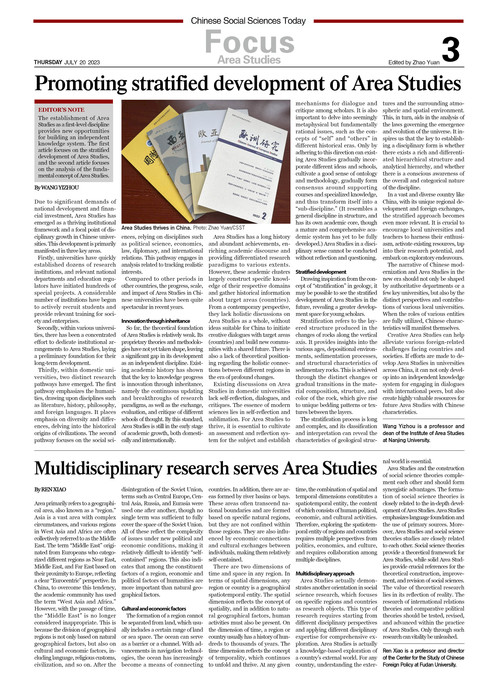Multidisciplinary research serves Area Studies
2023-07-20 17:07:12
By REN XIAO
Area primarily refers to a geographical area, also known as a “region.” Asia is a vast area with complex circumstances, and various regions in West Asia and Africa are often collectively referred to as the Middle East. The term “Middle East” originated from Europeans who categorized different regions as Near East, Middle East, and Far East based on their proximity to Europe, reflecting a clear “Eurocentric” perspective. In China, to overcome this tendency, the academic community has used the term “West Asia and Africa.” However, with the passage of time, the “Middle East” is no longer considered inappropriate. This is because the division of geographical regions is not only based on natural geographical factors, but also on cultural and economic factors, including language, religious customs, civilization, and so on. After the disintegration of the Soviet Union, terms such as Central Europe, Central Asia, Russia, and Eurasia were used one after another, though no single term was sufficient to fully cover the space of the Soviet Union. All of these reflect the complexity of issues under new political and economic conditions, making it relatively difficult to identify “self-contained” regions. This also indicates that among the constituent factors of a region, economic and political factors of humanities are more important than natural geographical factors.
Cultural and economic factors
The formation of a region cannot be separated from land, which usually includes a certain range of land or sea space. The ocean can serve as a barrier or a channel. With advancements in navigation technologies, the ocean has increasingly become a means of connecting countries. In addition, there are areas formed by river basins or bays. These areas often transcend national boundaries and are formed based on specific natural regions, but they are not confined within those regions. They are also influenced by economic connections and cultural exchanges between individuals, making them relatively self-contained.
There are two dimensions of time and space in any region. In terms of spatial dimensions, any region or country is a geographical spatiotemporal entity. The spatial dimension reflects the concept of spatiality, and in addition to natural geographical factors, human activities must also be present. On the dimension of time, a region or country usually has a history of hundreds to thousands of years. The time dimension reflects the concept of temporality, which continues to unfold and thrive. At any given time, the combination of spatial and temporal dimensions constitutes a spatiotemporal entity, the content of which consists of human political, economic, and cultural activities. Therefore, exploring the spatiotemporal entity of regions and countries requires multiple perspectives from politics, economics, and culture, and requires collaboration among multiple disciplines.
Multidisciplinary approach
Area Studies actually demonstrates another orientation in social science research, which focuses on specific regions and countries as research objects. This type of research requires starting from different disciplinary perspectives and applying different disciplinary expertise for comprehensive exploration. Area Studies is actually a knowledge-based exploration of a country’s external world. For any country, understanding the external world is essential.
Area Studies and the construction of social science theories complement each other and should form synergistic advantages. The formation of social science theories is closely related to the in-depth development of Area Studies. Area Studies emphasizes language foundation and the use of primary sources. Moreover, Area Studies and social science theories studies are closely related to each other. Social science theories provide a theoretical framework for Area Studies, while solid Area Studies provide crucial references for the theoretical construction, improvement, and revision of social sciences. The value of theoretical research lies in its reflection of reality. The research of international relations theories and comparative political theories should be tested, revised, and advanced within the practice of Area Studies. Only through such research can vitality be unleashed.
Ren Xiao is a professor and director of the Center for the Study of Chinese Foreign Policy at Fudan University.



